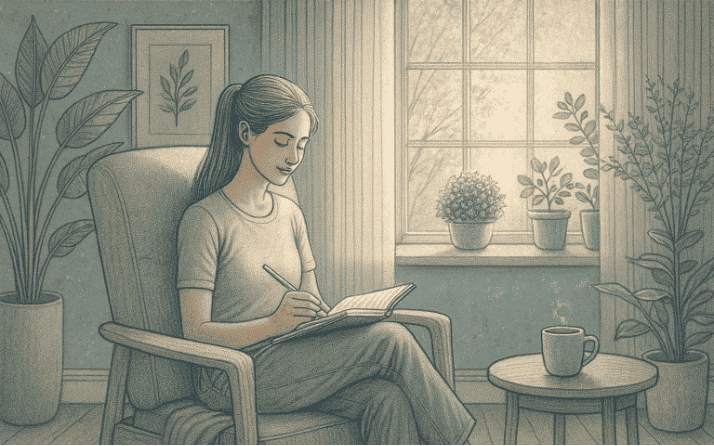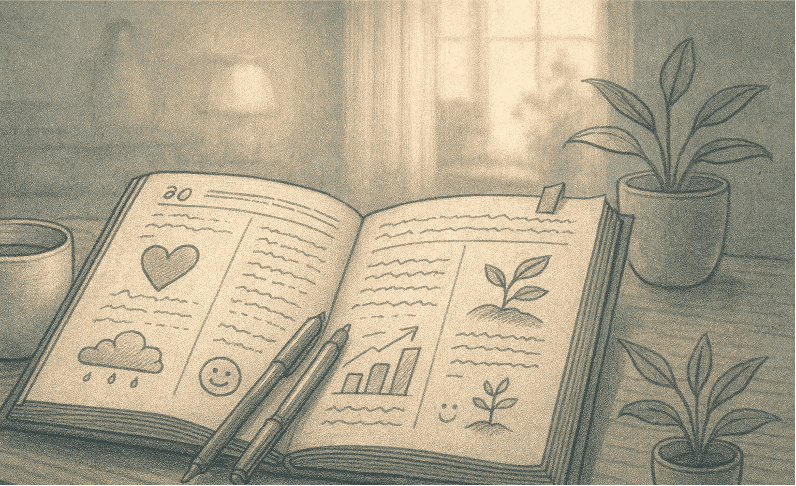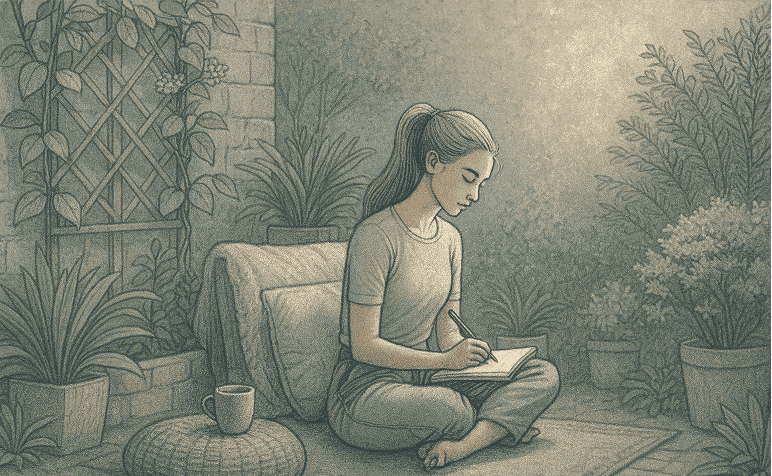
Key Takeaways
- Journaling is a simple yet powerful tool for improving mental health. It helps organize your thoughts, release emotions, and gain perspective, reducing stress and boosting emotional clarity.
- Different types of journaling serve unique purposes. Gratitude journaling builds positivity, bullet journaling improves organization, while expressive or reflective journaling helps process emotions and trauma.
- The benefits go beyond emotional relief. Regular journaling can improve mood, enhance self-awareness, sharpen focus, and even support therapy or personal growth.
- Getting started is easy. All you need is a notebook or app, a few quiet minutes each day, and a willingness to be honest with yourself.
- Mission Connection Healthcare incorporates journaling techniques into evidence-based treatment, helping you develop this valuable tool as part of comprehensive mental health care.
Why Journaling Supports Mental Health
When you’re struggling with anxiety, depression, or overwhelming emotions, your thoughts can feel like a tangled mess inside your head. They spin endlessly, overlapping and intensifying until you can’t distinguish one worry from another. This mental chaos makes everything feel more difficult and confusing.
Journaling is a way to untangle those thoughts. When you write, you take what’s swirling internally and place it onto paper or screen where you can actually see it. This simple act of externalizing your inner experience creates distance and clarity. Suddenly, thoughts that felt overwhelming become manageable. Emotions that seemed impossible to name become words you can understand.
Journaling isn’t about writing perfectly or creating something others will read. It’s a private conversation with yourself, a tool for understanding your own mind and emotions. There’s no right or wrong way to journal; whatever helps you process your experiences and feel better is exactly what you need.
Many therapists recommend journaling as part of mental health treatment because it extends the work you do in therapy sessions into your daily life. Between appointments, journaling helps you notice patterns, track your progress, and practice new skills. It becomes a companion in your healing journey.
Mission Connection offers flexible outpatient care for adults needing more than weekly therapy. Our in-person and telehealth programs include individual, group, and experiential therapy, along with psychiatric care and medication management.
We treat anxiety, depression, trauma, and bipolar disorder using evidence-based approaches like CBT, DBT, mindfulness, and trauma-focused therapies. Designed to fit into daily life, our services provide consistent support without requiring residential care.
Mental Health Benefits of Journaling
Processing Difficult Emotions
When painful emotions arise: grief, anger, fear, shame, they often feel too big to handle. Journaling provides a safe container for these feelings. You can express emotions fully without worrying about how others might react or whether you’re “overreacting.”
Writing about difficult emotions helps you move through them rather than suppressing or avoiding them. As you write, the intensity often softens. You gain perspective on what triggered the emotion and what it’s trying to tell you. This processing is essential for emotional healing.
Identifying Patterns in Thoughts and Behaviors
Your journal becomes a record over time, revealing patterns you might not otherwise notice. You might find that your anxiety spikes every Sunday evening, that certain situations consistently trigger negative self-talk, or that specific activities reliably improve your mood.
These insights are valuable. Once you recognize patterns, you can work with your therapist to address them or make informed changes to your daily life. You develop self-awareness that supports better mental health decisions.
Reducing Anxiety and Stress
Anxiety thrives on uncertainty and racing thoughts. Journaling interrupts this cycle. When you write down your worries, you’re essentially telling your brain, “I’ve captured this concern; I don’t need to keep cycling through it.” This simple act can reduce mental clutter and create calm.
Writing about stressful situations also helps you problem-solve more effectively. When stress lives only in your mind, it feels overwhelming. On paper, you can break problems into smaller pieces, consider different perspectives, and identify concrete next steps.
Tracking Progress and Growth
Mental health recovery isn’t always linear, and on difficult days, you might feel like you’re not making progress. Your journal provides evidence otherwise. Looking back at entries from weeks or months ago shows how far you’ve come, what strategies have helped, and how you’ve grown.
This tangible record of progress builds hope and motivation during challenging times. It reminds you that difficult periods pass and that you’ve successfully gotten through them before.

Types of Journaling for Mental Health
1. Prompt journaling
This is often the easiest way to begin journaling for mental health. This type of journaling uses prompts like specific questions or topics to help generate ideas of what to write about.
2. Bullet journaling
This is a more organized approach to journaling and uses bullet lists when writing. This type of journaling can be a great way to help organize thoughts or to create a list of goals.
3. Gratitude journaling
This involves acknowledging things that we appreciate or are thankful for. By focusing on the positive aspects of our lives, we can shift out of a cycle of negative thinking.
4. Expressive journaling
This can be a great way to help process challenging events or experiences. By writing about a difficult situation, we can stop ruminating in our heads and look at it from a different perspective.
5. Self-compassion journaling
Too often, we can be critical of ourselves and tell ourselves negative thoughts. With self-compassion journaling, we can instead express self-supportive thoughts.
6. Visual journaling
This allows feelings and emotions to be expressed through a visual form. Different mediums can be used, like drawing, painting, or even pasting pictures onto paper that are cut out from magazines.
Some types of journaling may be a better fit based on your personal preferences. No one type of journaling is better than another.
How to Get Started with Journaling

Choosing Your Format
Decide whether you prefer writing by hand or digitally. Paper journals offer a tactile, screen-free experience that many people find calming. Digital journaling, whether in a document, notes app, or specialized journaling app, offers convenience, searchability, and accessibility from multiple devices.
Neither format is better. Choose what you’ll actually use consistently. You might even use both for different purposes.
Starting Small and Building Consistency
Don’t pressure yourself to write pages every day. Start with just five minutes or a few sentences. Consistency matters more than length. Writing a little bit regularly builds the habit and provides more benefits than occasional lengthy entries.
Set realistic expectations based on your current capacity. If you’re dealing with significant depression or time constraints, even one sentence daily is valuable.
Finding the Right Time
Experiment with different times to see when journaling fits naturally into your routine. Some people prefer morning journaling to set intentions for the day. Others find evening journaling helps process the day’s events and clear their mind before bed.
You might also journal during specific situations, like when anxiety arises or after therapy sessions. There’s no rule about when journaling should happen—find what works for you.
Creating a Comfortable Space
While you can journal anywhere, having a comfortable, relatively quiet space enhances the experience. This might be a cozy chair, your bed, a quiet corner, or even outside. The space should feel safe and allow you to focus.
What to Write About When You’re Stuck
If you’re staring at a blank page, unsure what to write, try these starting points: describe your current emotional state, write about something bothering you, list three things from today (without judgment about whether they’re significant), describe a challenge you’re facing, or simply write “I don’t know what to write” and continue from there.
The act of writing often leads somewhere, even when you start with no clear direction.
Overcoming Common Journaling Barriers
Many people want to journal but encounter obstacles that prevent them from starting or maintaining the practice.
You might feel that you don’t know what to write. That’s okay—journaling isn’t a test. You’re not trying to write something profound or interesting. Even writing “I feel anxious today and I’m not sure why” is journaling. Prompts can also help when you feel stuck.
Even two minutes of journaling counts. You don’t need extended uninterrupted time. Brief, consistent entries provide significant benefits. You might journal while waiting for coffee to brew or during a lunch break.
No one will read your journal except you, so don’t stress about how you write. Grammar, spelling, and eloquence don’t matter. Journaling is for processing, not performing. Give yourself permission to write messily and imperfectly.
If perfectionism makes you hesitate, remind yourself that your journal is a tool, not a product. It doesn’t need to be beautiful or complete or consistent. Some entries might be one sentence. Others might be pages. Both are fine.
Mission Connection Healthcare: Supporting Your Mental Health Journey

At Mission Connection Healthcare, we view journaling as a powerful tool that complements therapy and deepens self-understanding. Our therapists often teach journaling techniques that fit your goals and help you process thoughts and emotions in meaningful ways.
In Cognitive Behavioral Therapy, you might work with thought records to challenge negative thinking patterns. For Dialectical Behavior Therapy, we use diary cards and guided writing to help you track emotions, habits, and progress as you build emotional awareness.
During individual therapy, your journaling becomes part of the conversation. Together, you and your therapist can unpack what you’ve written: spotting patterns, celebrating growth, and addressing any challenges that come up in your reflections.
Group therapy can include journaling, too. Sharing insights from your writing helps you connect with others, learn fresh perspectives, and pick up new journaling techniques that may strengthen your own practice.
With both in-person and telehealth sessions across California, Virginia, and Washington, getting support that fits your lifestyle has never been easier.
Call Today 866-833-1822.
Frequently Asked Questions (FAQ)
Do I need to journal every day for it to help?
No. While daily journaling provides the most consistent benefits, any regular practice helps. Even journaling a few times per week supports mental health. Focus on sustainability rather than perfection. It’s better to journal three times weekly long-term than to burn out trying to write daily.
What if I write about something painful and feel worse afterward?
Processing difficult emotions through writing can temporarily intensify feelings as you sit with them. This is normal and usually passes. However, if journaling consistently makes you feel significantly worse, discuss this with your therapist. They can teach you techniques for processing difficult content safely or suggest modifications to your practice.
Should I let my therapist read my journal?
This is entirely your choice. Your journal is private unless you decide to share it. Some people find it helpful to show specific entries to their therapist, while others prefer to simply discuss insights verbally. Either approach is appropriate. Your therapist will respect your boundaries around journal privacy.
What should I do if journaling brings up issues I need help processing?
If journaling reveals difficult emotions, patterns, or memories that feel overwhelming to process alone, this is an important signal to seek professional support. Mission Connection Healthcare provides individual therapy where you can safely consult with a trained therapist. We create a supportive environment to help you work through challenging material that surfaces during journaling, teaching you skills to process emotions effectively and develop healthier coping strategies.


